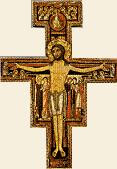
The word ‘devotion’ is derived from the Latin verb ‘devovere’, meaning ‘to consecrate’. Devotion is nothing more than fidelity and resoluteness in the following of Christ after an admirable example.
The devoted follower is one who has consecrated his entire life to discipleship. While a devotee of a saint is often associated with one who invokes his patron saint in his daily prayers and frequents celebrations, churches, and chapels in the saint's honor, the devoted follower, the devoted disciple, is someone much more. For him, the imitation of the saint is the fundamental character of his existence, the foundation of his identity and the key to his personal destiny in Christ.
One can imitate a saint by incorporating the saint’s behavior, ideals, habits, customs, and virtues into his life. However, this form of devotion moves only on the material level. True devotion to a Saint requires a formal union of heart and mind with the Saint. There is no greater imitation than for the disciple to become one with his teacher. Our Lord Jesus Christ taught this kind of devotion when He said of His own disciples, ‘No disciple is greater than his Master; a disciple should rejoice to be like his Master.’
True devotion then, to a Saint must transcend material devotion. For such a devotion fails to incorporate the truth in Christ that the Saints are means not ends to imitation of Christ Jesus, the One Teacher of all. To truly imitate a Saint then, is to make the desire, wisdom, and resoluteness that was his to follow and imitate Christ, one's own. In such a manner, devotion to a Saint is transfigured into authentic Christian life and perfection.
















